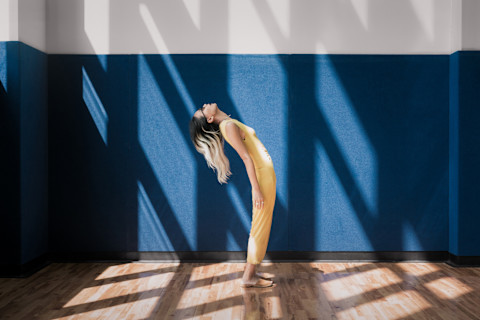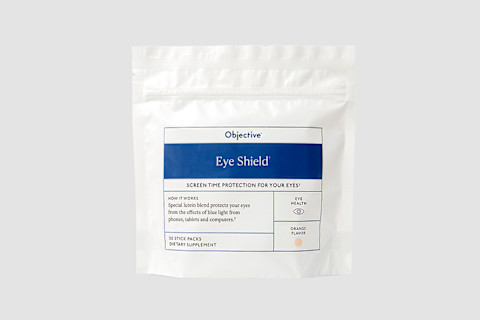The 4 Most Important Things You Didn't Know About Blue Light

As you read this, you're scrolling through your phone or computer screen, and chances are—because 90% of Americans spend at least two hours on their devices every day—you'll still be staring at said screen after you're done. No judgment here—we all do it!
And if you're like us, you're curious about the impact all this blue light is having on your eyesight. You've heard that blue light keeps us awake at night, suppressing melatonin that nudges us to sleep naturally—and you definitely know at least one person with blue-light-blocking glasses.
But did you know that your eyes actually have an internal pair of blue-light-blocking glasses? Read on for four science-backed facts about blue light that you might not have known before; plus, how to protect your eyes from its negative effects:
Blue light is actually everywhere.
It's not just from our backlit devices. Blue light primarily comes from the sun (fun fact: It's the reason clear skies look blue), and it's just one color on the spectrum of visible light rays that we can see. Our eyes have always been exposed to it, but as humans, we just weren't physiologically built to handle the overload of artificial blue light that is now part of our daily routine.
Not all blue light is bad!

The photoreceptors in our eyes detect light not just for the process of vision but also for our circadian rhythm1, which cues up a number of systems in the body. The sun's blue light, which is a high-energy visible (HEV) light, regulates our natural sleep and wake cycles2, helps boost alertness, and even elevates our mood (hence why artificial blue light is used as a treatment for seasonal affective disorder).
Chronic overexposure to blue light is what we need to watch out for. While sunlight can be healthy for us for the reasons above, bombarding our eyes with artificial blue light from LED-backlit screens up until we close our eyes at night can disrupt our circadian rhythm.
Macular pigment in our eyes filters blue light.
The structure of our eyes naturally blocks harmful, invisible UV rays from reaching our retinas, but virtually all visible blue light enters our eyes. If you remember one thing from this article, let it be macular pigment, the closest thing we have to a built-in blue light filter.
Macular pigment is comprised of two carotenoids called zeaxanthin and lutein that we can only get from our diet in foods like leafy green veggies, carrots, pumpkin, and egg yolks, and this pigment in our eyes absorbs high-energy blue light3. The denser the pigment, the more blue light is blocked. What's compelling is that scientists and ophthalmologists are currently studying what happens after supplementing with these two carotenoids, and the results of several placebo-controlled clinical trials4 reveal that as little as six months5 of supplementing zeaxanthin and lutein can improve macular pigment density.
Eye Shield, a daily supplement from Objective, contains the clinically researched dose of both carotenoids to help protect your eyes from the negative effects of blue light from digital devices, help reduce eyestrain and eye fatigue, and support healthy vision long term. The cool thing is, it isn't in capsule form—Eye Shield comes in a delicious, easy-to-take stick pack that you can mix with a liquid like juice or a glass of water.
Blue light affects kids and adults differently.

The eyes of children under 14 aren't fully developed, so they don't have as much protection from HEV light as adults do. Studies have shown that increased and prolonged exposure to HEV light is a contributing factor in nearsightedness among children—yet another reason setting boundaries around devices and screen time for young kids is a big deal.
- Filter it out. Set up your phone, tablets, and laptop to use a blue light filter based on the time of day (better yet, avoid screens altogether at least two hours before bedtime), or try amber glasses at night to help filter out the blue light in your surroundings.
- Supplement. Consider adding a dietary supplement like Eye Shield to your routine that provides the recommended daily dose of lutein and zeaxanthin, proved to support eye health. A more all-encompassing daily supplement for well-being that delivers eye-supporting benefits, like Everything Armor, is another easy option. (Let's be real—for many, this might be easier than putting away the phone right before bed!)
- Warm up your lighting. If you can, whenever your incandescent bulbs burn out, switch over to LED bulbs with a warmer color range to cut out blue light in your home in the evenings. Having dimmable lights helps support your circadian rhythm, too.
Use code mbg25 for 25% off all Objective products.
Shop this story:
If you are pregnant, breastfeeding, or taking medications, consult with your doctor before starting a supplement routine. It is always optimal to consult with a health care provider when considering what supplements are right for you.


